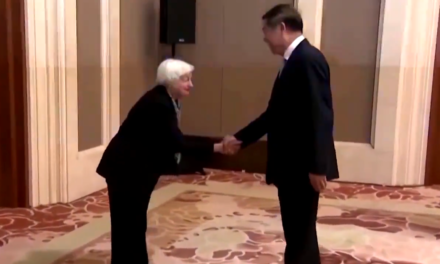
Republicans Move to End China’s Favored Trade Status

After recent Republican victories in Congress, a renewed push to end China’s Permanent Normal Trade Relations (PNTR) status—also known as “most-favored-nation” status—is gaining momentum. If successful, this move would change how the U.S. trades with China, raise prices on imported goods, and possibly shift the balance of economic power. Let’s explore the potential impacts of this policy shift on trade dynamics, prices, and the economic effects for both the U.S. and China.
Background: China’s Longstanding Trade Status
In 2000, the U.S. granted China PNTR status, a designation allowing goods from China to enter the American market with low tariffs. This move aimed to promote economic ties and give U.S. consumers access to affordable goods, and the results were dramatic. From 2001 to 2021, imports from China quadrupled, reaching a value of $500 billion, while prices on many consumer items fell.
Critics argue, however, that China used this relationship to outcompete U.S. industries. American manufacturers moved production overseas to benefit from China’s low labor costs, resulting in job losses at home. Now, Republicans believe it’s time for change. “For too long, the Chinese Communist Party has taken advantage of America’s open hand with predatory economic practices that target the American economy, our workers, businesses, and our national security,” a spokesperson for the House China Committee told Fox News Digital. By revoking PNTR, Republicans hope to reset trade with China in a way that protects American jobs, reduces reliance on Chinese goods, and addresses national security concerns.
Proposed Changes to U.S.-China Trade Relations
Ending PNTR would reset tariffs on Chinese goods to much higher levels than they are today. For instance, President-elect Donald Trump has already proposed a 60% across-the-board tariff on all Chinese imports. Other Republican leaders are pushing for tariffs on certain goods to rise as high as 100%. For context, the current tariffs on most products from China are either 0% or very low. A shift this drastic would make Chinese products far more expensive in the U.S., discouraging imports and incentivizing American companies to produce goods domestically.
This proposed increase in tariffs is part of a broader Republican effort to “protect American jobs and hold the Chinese Communist Party accountable,” as Senator Tom Cotton, a leading proponent, has argued. In July, the GOP’s platform explicitly called for an end to China’s PNTR status. By September, Senators Tom Cotton, Marco Rubio, and Josh Hawley had introduced a bill aiming to revoke PNTR and impose new tariffs on Chinese goods. The bill would allow the president to set further limits on imports deemed a risk to U.S. security or economic interests.
Economic Impact on American Consumers and Industries
The immediate impact of revoking PNTR would be inflation on consumer goods. As tariffs increase, so would prices on items like electronics, clothing, and home goods, which are currently heavily imported from China. The economic consequences would affect consumers directly, making daily purchases more expensive. Inflation could rise, adding pressure to the economy at a time when affordability is already a concern.
However, there’s a flip side: these changes could benefit certain American industries. With Chinese goods costing more, U.S. companies might invest in domestic manufacturing, bringing some jobs back to American soil. For industries like textiles, furniture, and some types of electronics, this shift could create new job opportunities. But the cost to set up these operations could still mean higher prices in the long term.
Critics argue that revoking PNTR might come with hidden costs. Research by economic analysts at the Peterson Institute for International Economics suggests that ending PNTR could cause a “short-term decline in U.S. gross domestic product relative to baseline from which the economy never fully recovers.” The authors explain that the U.S. might face a permanent loss of economic output, with sectors like agriculture, durable manufacturing, and mining hit the hardest. If China retaliates with its own tariffs, American industries could face further losses. For instance, China is a major buyer of U.S. agricultural goods, like soybeans, and any new tariffs on these products could hurt American farmers. Additionally, the U.S. stock market could feel the impact, as companies with ties to Chinese trade might see declines in stock prices.
How This Change Could Affect China
Revoking PNTR would be a significant blow to China, which relies heavily on exports to the U.S. If tariffs on Chinese goods rise dramatically, China could lose substantial market share in the U.S. and face economic challenges as it tries to offset the losses. Experts expect that China may respond by imposing higher tariffs on American imports, aiming to protect its own economy. As one policy expert explained, “China buys tens of billions of dollars’ worth of agricultural products, primarily soybeans, each year,” meaning that a trade war could directly affect U.S. farmers.
This shift also threatens to disrupt China’s long-term economic goals. China’s “Made in China 2025” plan aims to make the country a leader in advanced technologies, including artificial intelligence, 5G, and quantum computing. Losing access to the U.S. market could delay China’s ambitions in these sectors. Moreover, without PNTR, American companies might hesitate to invest in China, shifting their resources to countries like India, Mexico, and Vietnam.
Who Stands to Gain?
Several groups and countries could benefit from ending China’s favored trade status. Here’s a closer look:
- American Manufacturers: Domestic manufacturing sectors stand to gain from reduced competition with Chinese imports, potentially leading to more jobs and new investments in U.S.-based production facilities. Higher tariffs would make “reshoring” manufacturing operations—bringing jobs back to the U.S.—more financially viable, helping to rebuild some of the industries that previously moved overseas.
- Other Trading Partners: As the U.S. shifts its trade strategy away from China, other nations could emerge as alternative suppliers. Vietnam, India, and Mexico, for example, might benefit as U.S. companies look to reduce their reliance on China for lower-cost goods. This shift could strengthen trade ties with these countries and contribute to economic growth in those regions.
- U.S. National Security Interests: Ending PNTR would give the U.S. more control over imports from China in sectors deemed critical to national security, such as telecommunications and defense-related technologies. This move would help the U.S. reduce its dependence on China for these vital goods, improving its security resilience.
Challenges and Concerns
Despite these potential benefits, ending PNTR comes with considerable risks. Higher prices on consumer goods, supply chain disruptions, and economic uncertainties could impact American households. For instance, items like smartphones, laptops, and household essentials may become significantly more expensive. As critics point out, “Repealing PNTR would automatically reset the tariffs on Chinese goods to higher levels,” which could cause a “domino effect” of price hikes throughout the economy.
Additionally, revoking PNTR would not solve all U.S.-China economic tensions. China might respond by strengthening its alliances with other global powers, such as the European Union, or doubling down on its economic growth initiatives. In the worst case, a prolonged trade conflict could lead to further instability in global markets, affecting countries far beyond the U.S. and China.
As Republicans work to end China’s favored trade status, the decision reflects a broader desire to protect American jobs, reduce economic dependence on China, and bolster national security. If PNTR is revoked, it could be a transformative step in U.S. trade policy, reshaping the economy in both challenging and promising ways. While some American industries stand to gain, the potential for inflation and trade tensions remains high, making this























Republicans are wanting to end the favorable trade status of China. True. What they are not telling you is that they are planning on influencing the remainder of South East Asia by sourcing those Chinese made products to Vietnam, Indonesia, Malaysia, Thailand, Cambodia, and India (but be wary of India, it still favors Russia). Ending Chinese sourcing will not bring jobs back to the USA. All it will do is relocated the jobs elsewhere in South East Asia.
So this sentence is essentially part truth (first part) and part lie (second part) when Oliver says, “A shift this drastic would make Chinese products far more expensive in the U.S., (true) discouraging imports and incentivizing American companies to produce goods domestically.” (not so true, maybe a lie) Nope, not happening, see above. Investors are looking for profits and do not care where the products are made. Again, Oliver further elaborates, “For industries like textiles, furniture, and some types of electronics, this shift could create new job opportunities. ” Nope not happening because these are all considered low tech and can be made for less in S.E. Asia. By the way, China has factories in most of the S.E. Asia countries and ships orders of low tech products to those factories to the USA every day! China still makes money!!! These days, much of what China makes is the higher tech products. Yeah, the label might say “Made In Vietnam” but the tag does not tell you the home country ownership of the company that made the product. Oliver seems to avoid this part of the picture!
Yes, agriculture will suffer greatly. Expect retaliatory tariffs from China in many areas. Also, expect China to simply buy companies in the USA to offset tariffs. They are already doing it. Smithfield Foods is a wholly owned subsidiary of Hong Kong-based WH Group Limited, the largest pork company in the world. WH Group trades on the Hong Kong Stock Exchange under the stock code 00288. Expect more of this which could have the negative affect of further affecting our food supply and other industries.
National Security interests may not be very affected because the USA can already do whatever it needs to do to ensure its national security interests. It may just boil down to a little less paperwork.
The best path would seem to be 1) List critical markets and make sure we make sufficient products in those markets such as food, pharma, electronic chips and circuitry, AI and memory, armaments, etc. 2) Work with our allied countries and their companies. 3) Provide incentives to re-patriate some factories. Promote Mexico, Canada, Europe, and ASEAN for low tech to middle tech products. 4) No tariffs on allied countries. 5) Minimal tariffs to high risk industries on countries not considered our allies.
To add to what Tom wrote. China is the world leader in producing solar panels. The US keeps imposing high tariffs on them, so China has figured out how to quickly build new production facilities in other SE Asia countries, to get around the tariffs. So no matter what we do, China will always have a solution for our problem. We will end up paying more in the short run, or even risk the destruction of the world trading system.
Think June 17, 1930.